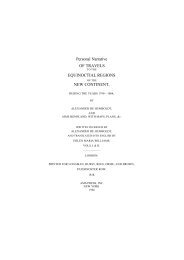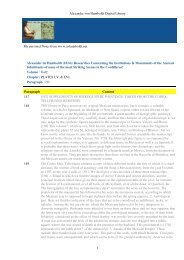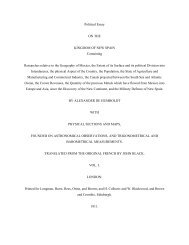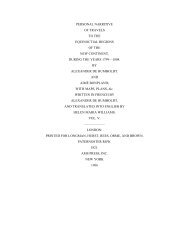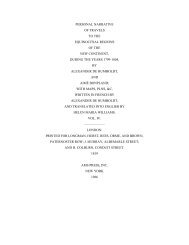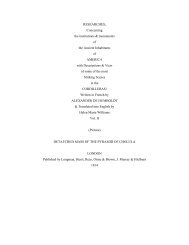See the complete document here
See the complete document here
See the complete document here
Create successful ePaper yourself
Turn your PDF publications into a flip-book with our unique Google optimized e-Paper software.
DESCRIPTION'S or N'ATURE BY THE ARIAN RACTd. 49<br />
ojily of organic, but of inanimate nature ; of <strong>the</strong> transition<br />
from drought to tropical rain ; of <strong>the</strong> appearance of <strong>the</strong> first<br />
cloud on <strong>the</strong> deep azure of <strong>the</strong> pure sky, when <strong>the</strong> long-desired<br />
Etesian winds are first heard to rustle amid <strong>the</strong> fea<strong>the</strong>ry foli-<br />
age of <strong>the</strong> lofty palms.<br />
The present would appear a fitting place to enter somev.hat<br />
fur<strong>the</strong>r into <strong>the</strong> domain of Indian delineations of nature.<br />
"<br />
If<br />
we suppose," whites Lassen, in his admirable work on Indian<br />
antiquity,* " that a part of <strong>the</strong> Arian race emigrated to India<br />
from <strong>the</strong>ir native region in <strong>the</strong> northwestern portion of <strong>the</strong><br />
continent, <strong>the</strong>y would have found <strong>the</strong>mselves surrounded by a<br />
wholly unknown and marvolously luxuriant vegetation.<br />
The<br />
mildness of <strong>the</strong> climate, <strong>the</strong> fruitfulness of <strong>the</strong> soil, and its<br />
rich and spontaneous producis, must have imparted a brighter<br />
coloring to <strong>the</strong> new life opened before <strong>the</strong>m. Owing to <strong>the</strong><br />
originally noble characteristics of <strong>the</strong> Arian race, and <strong>the</strong> possession<br />
of superior mental endowments, in which lay <strong>the</strong> germ<br />
of all <strong>the</strong> nobleness atid greatness to which <strong>the</strong> Indians have<br />
attained, <strong>the</strong> aspect of extern il nature gave rise in <strong>the</strong> minds<br />
of <strong>the</strong>se nations to a deep meditation on <strong>the</strong> forces of nature,<br />
which has proved <strong>the</strong> means of inducing that contemplative<br />
tendency which we find so intimately interwoven in <strong>the</strong> most<br />
ancient poetry of <strong>the</strong> Indians. The all-powerful impression<br />
thus produced on <strong>the</strong> minJs of <strong>the</strong> is people most clearly<br />
manifested in <strong>the</strong> fundamental dooma of <strong>the</strong>ir belief—<strong>the</strong> rec-<br />
cgnition of <strong>the</strong> divine in nature. The freedom from care,<br />
and <strong>the</strong> ease of supporting existence in such a climate, were<br />
also conducive to <strong>the</strong> same contemplative tendency. Who<br />
could devote <strong>the</strong>mselves with less hinderance to a profound<br />
meditation of earthly life, of <strong>the</strong> condition of man after death,<br />
and of <strong>the</strong> divine essence, than <strong>the</strong> anchorites, dwelling amid<br />
forests,! <strong>the</strong> Brahmins of India, whose ancient schools consti-<br />
**<br />
Lassen, Ind. Alterthuviskunde, bd.i,, s. 412-415,<br />
t Respecting <strong>the</strong> Indian forest-herrnits, Vanaprestise (Sylvicolae) aud<br />
Sramani (a name which has been altered into Sarmaui and Germani),<br />
see Lassen, ^^ de nominibus quibus veteribus appellantur Indorum philosophi,^^<br />
in <strong>the</strong> Rhein. Museum fur Philologie, 1833, s. 178-180. Wilhehn<br />
Grimm recognizes something of Indian coloring in <strong>the</strong> description<br />
of <strong>the</strong> magic forest by a priest named Lambrecht, in <strong>the</strong> Song of Alexander,<br />
composed more than 1200 years ago, in immediate imitation of<br />
a French original. The hero comes to a wonderful wood, ^v<strong>here</strong><br />
maidens, adorned with supernatural charms, spring from large flowers.<br />
He remains so long with <strong>the</strong>m that both flowers and maidens fade away<br />
(Compare Gervinus, bd. i., s. 282, aud Massmann's Denkmdler, bd. i-,<br />
B. 16.) These are tlie same as <strong>the</strong> maidens of Edrisi's Eastern magic<br />
island of Vacvac, called in <strong>the</strong> Latin version of <strong>the</strong> Masudi Chothbeddin,<br />
Vol. II.— C




